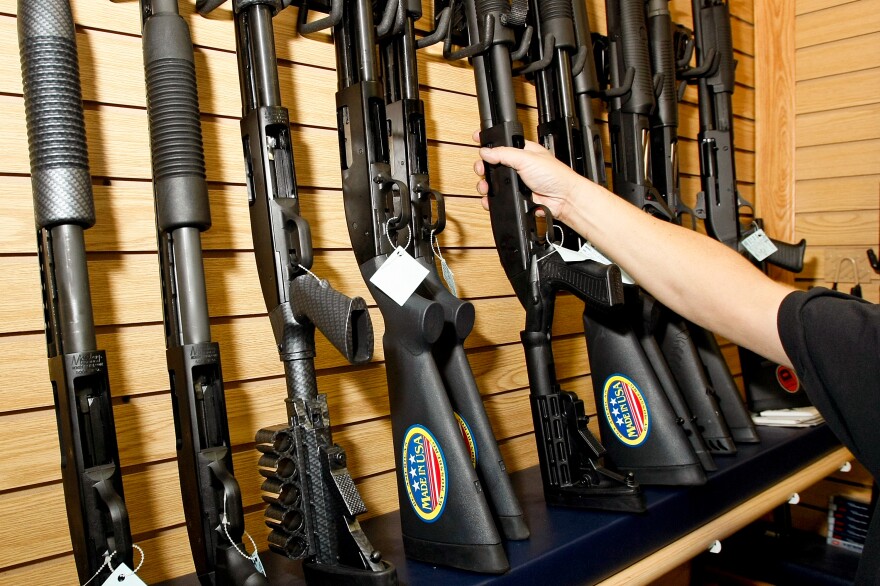Each year, convicted felons get thousands of weapons from licensed gun dealers. They skirt the mandatory background checks by having people who do qualify fill out the paperwork for them.
Now, the settlement of a lawsuit over a tragic murder-suicide in Kansas has made it easier to sue gun dealers who allow these "straw purchases" with a wink and a nod.
Twelve years ago, Elizabeth Shirley was living in rural southeastern Kansas, estranged from her abusive husband Russell Graham. One Friday afternoon she took her 8-year-old son Zeus for a court-ordered visit with his dad. She didn't know that Graham, a convicted felon, had just bought a shotgun, with help from his grandmother.
"The owner of the store asked Russell if he had been a good boy, and Russell said 'No, that's why we're gonna put it in her name.' And they continued on with the sale," Shirley says.
The owners of Baxter Gun and Pawn say they didn't know Graham was a felon, and that they were convinced the grandmother was buying the gun as a gift for young Zeus. She filled out the form and passed the mandatory federal background check, as Graham waited.
"He paid cash for the gun, he carried out the gun, and he purchased the ammo," Shirley says.
And just hours later, he used it to kill the boy, and himself.

"I lost my son," Shirley says. "At the time, my only child. At the age of eight."
She filed a negligence suit against the gun shop, and the Kanas Supreme Court eventually ruled that gun dealers must exercise the "highest standard of reasonable care" to keep weapons away from felons. That's higher standard than had been in place.
She recently settled with the gun shop owners for $132,000.
"This case is hugely important," says Jonathan Lowy with the Brady Center to Prevent Gun Violence.
He argues that gun control advocates face a veritable brick wall in Washington, where he says powerful gun rights lobbying groups consistently block gun control legislation. Civil litigation, he says, offers a chance to move the needle on restricting sales.
That's why, he says, getting a settlement, in Kansas, is meaningful.
"Gun dealers can be held accountable when they irresponsibly supply a dangerous person. That is a powerful message," he says.
Perhaps, but it's not one setting off alarms in most gun shops.
"It's the same ol' same ol' that's been going on for years. It ain't gonna change anything," says Steve Brackeen, who owns Blue Steel Guns and Ammo here in Raytown, Mo.
He says so-called "straw purchases" are illegal, and he routinely thwarts people trying to make them.
"They're nervous," he says. "You say, 'Hey are you filling out the paperwork? Who's buying this gun?' You ask point blank, 'Is she buying it, or are you buying it?' It's usually a man with a woman, and he's duped her into buying a gun because she don't know that she can't do that."
Brackeen says he knows of no gun shop owners who would risk losing their license to make a shady sale. Brady Campaign statistics bear this out, showing that only 5 percent of gun shops, sell 90 percent of the new guns ultimately used in crimes.
The NRA declined to comment on the Kansas litigation, but Scott Nehrbass, the lawyer representing Baxter Gun and Pawn, says his clients never admitted liability.
He says the legal precedent will shape Kansas law, but that's about it.
"There is a federal statute that specifically limits what kind of claims can and cannot be made, and that federal statute still applies in all 50 states, and nothing has changed in that regard," he says.
So, it's difficult to frame Elizabeth Shirley's case as a watershed for the broader gun control movement.
And another thing hasn't changed.
The store that sold the shotgun that killed young Zeus Graham is still in business. A federal Bureau of Alcohol, Tobacco, Firearms and Explosives investigation cleared them of negligence.
Copyright 2021 KCUR 89.3. To see more, visit KCUR 89.3. 9(MDEwMTk5OTQ0MDEzNDkxMDYyMDQ2MjdiMw004))











